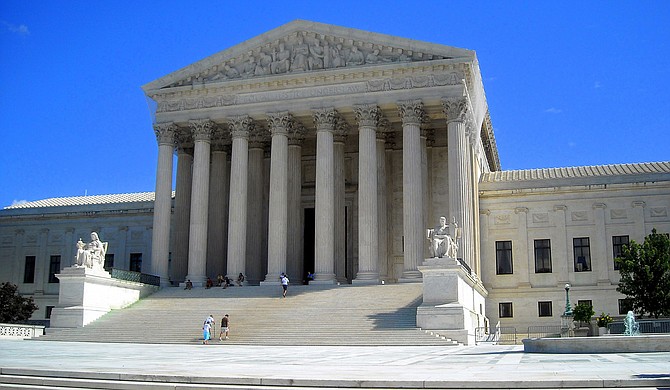The Supreme Court has nine justices. Nine justices who are left to their own devices to interpret the constitution however they deem fit. Photo courtesy Flickr/NCinDC
Political discourse serves its purpose. It mixes a brand of entertainment with real-life policy, which helps keep political junkies like me engaged in current events. The mixture of debate, speeches and public hearings gives us, the American public, digestible talking points. These points are then repeatedly spewed out on social-media platforms or your go-to political news channels, where the guest political correspondent, commentator or analyst has 30 to 45 seconds to make their point as to why Jon Ossoff and the democrats lost the special election in Georgia or how Trumpcare is or isn't Obamacare Lite. American political discourse usually represents two out of the three branches of American government. The executive and legislative branches are fully represented in our social-media posts, our cable outlets and our voting booths. What about the third branch of government? Wait, what's the third branch of government, again? The judicial branch? What the hell do they do? Sadly, I'm convinced these questions are asked more than we would care to admit.
As a liberal or conservative, you know where you stand and who you support. For those on the fence, political rhetoric may help you in your decision-making. However, I assert that the ultimate decision should be made after piercing the political discourse veil and uncovering the truth hiding behind mundane political talking points.
The truth, for me, anyway, is whoever controls the White House, controls the future of this country. President Donald J. Trump controls who will be nominated for the Supreme Court of the United States whenever a vacancy becomes available. President Donald J. Trump controls the future of the Supreme Court. President Donald J. Trump controls the future of this country. As we know, SCOTUS rulings have left permanent tattoo markings on this country's body. Unlimited money in campaigns, the legitimization of the Affordable Care Act, the legalization of same sex marriage and the destruction of the Voting Rights Act of 1965 are just a few recent rulings that have and will continue to have a major impact in this country.
The Supreme Court has nine justices. Nine justices who are left to their own devices to interpret the constitution however they deem fit. Of course most people are familiar with justices such as Ruth Bader Ginsburg or Uncle Ruckus, I mean Clarence Thomas, but the other seven justices are just as important, with one who is viewed as the most important in legal circles and scholarship. Reports have circulated the Internet that Justice Anthony Kennedy is set to retire soon.
Justice Kennedy, whom Ronald Reagan appointed (See what I mean by controlling the future?), is known as the swing vote in a Supreme Court that is made up of four liberal justices and four conservative justices, leaving Kennedy as the lone, somewhat independent justice (He is more in the lean-conservative category). Out of the nine justices, President Donald J. Trump (Yes, I keep calling him president on purpose) has already appointed one conservative justice, Neil Gorsuch. There are potentially three other justices President Donald J. Trump can replace before his tenure comes to an end. Justice Kennedy, 80, Justice Stephen Breyer, 78, and Justice Ruth Bader Ginsburg, 84, who are all are either independent or a member of the liberal wing of the court, are getting "long in the tooth."
Admittedly, I voted for Hillary Clinton, a non-perfect candidate, because the balance of the Supreme Court was at stake. SCOTUS shapes equal-protection rights, reproductive rights, voting rights, income inequality, Fourth Amendment rights, LGBT rights, gerrymandering laws, travel bans, corporate monopolization, campaign finance and more.
Now, the Supreme Court will defer to states like Alabama to shape those rights. My rights. Your rights. Our rights. I may sound like a pompous jackass when I say this, but if everyone in this country was a lawyer and understood the importance, and longevity, of the Supreme Court, people would still be waiting in line, trying to cast their 2016 presidential votes.
Leslie McLemore II, a Jackson native, is now in Washington, D.C. He is a graduate of Jackson State University, North Carolina Central University School of Law and American University Washington College of Law.




Comments
Use the comment form below to begin a discussion about this content.
comments powered by Disqus